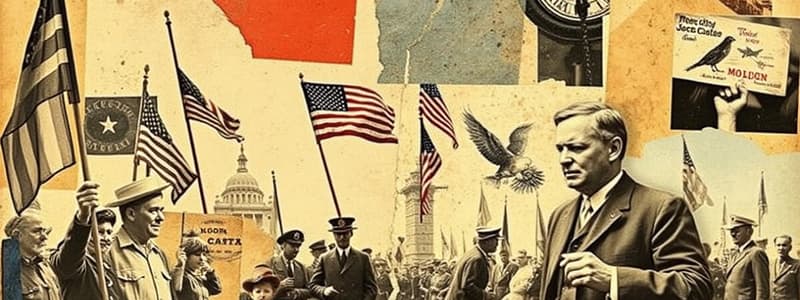Podcast
Questions and Answers
How did the Populists and the Progressives differ?
How did the Populists and the Progressives differ?
Populists were mainly aggrieved farmers advocating radical reforms, while Progressives were urban, middle-class reformers wanting to increase government’s role in reform while maintaining a capitalist economy.
Why did Populism fail?
Why did Populism fail?
Its constituents were mostly poor farmers whose daily struggle to make a living made political activity difficult.
Why did the Progressives achieve greater success?
Why did the Progressives achieve greater success?
They were an urban, middle-class movement with more economic and political clout, could devote more time to their causes, and did not intensify regional and class differences.
Who was Robert La Follette?
Who was Robert La Follette?
What is a ballot initiative?
What is a ballot initiative?
What is a referendum?
What is a referendum?
What is a recall election?
What is a recall election?
Why did Roosevelt win the 1904 election?
Why did Roosevelt win the 1904 election?
Why was Roosevelt called the 'Trustbuster'?
Why was Roosevelt called the 'Trustbuster'?
What were Roosevelt's progressive achievements?
What were Roosevelt's progressive achievements?
Who was William Howard Taft?
Who was William Howard Taft?
What is the 16th amendment?
What is the 16th amendment?
What is the 17th amendment?
What is the 17th amendment?
Why is the Progressive Era a turning point in American history?
Why is the Progressive Era a turning point in American history?
What are Roosevelt's policies often referred to as?
What are Roosevelt's policies often referred to as?
What did Wilson refer to his ideas and policies as?
What did Wilson refer to his ideas and policies as?
What role did Wilson assert government played in regulating business?
What role did Wilson assert government played in regulating business?
How did Wilson and Roosevelt differ in their views on trusts?
How did Wilson and Roosevelt differ in their views on trusts?
What was Wilson's stance on tariffs?
What was Wilson's stance on tariffs?
Name three things Wilson created.
Name three things Wilson created.
Why did Progressivism end?
Why did Progressivism end?
Flashcards are hidden until you start studying
Study Notes
Differences Between Populists and Progressives
- Populists were primarily aggrieved farmers advocating for radical reforms.
- Progressives consisted of urban, middle-class reformers aiming to enhance government roles while preserving capitalism.
Reasons for Populism's Failure
- Populism struggled as its base comprised poor farmers facing economic hardships, limiting their political engagement.
Success Factors of Progressives
- The movement was rooted in urban, middle-class demographics with significant economic and political influence.
- Progressives could dedicate more time and resources to their causes, contrasting with the Populist experience.
- Their focus did not escalate regional and class tensions, unlike Populism.
Robert La Follette
- A key figure among Progressive state leaders known for implementing reforms in Wisconsin, such as:
- Direct primary elections
- Progressive taxation
- Regulation of railroads
Electoral Mechanisms
- Ballot Initiative: Enabled voters to propose new legislation directly.
- Referendum: Allowed public voting on proposed laws.
- Recall Election: Permitted voters to remove officials from office before the end of their terms.
Roosevelt's Election and Reputation
- Won the 1904 election largely due to his effective management of Latin American relations.
- Dubbed the "Trustbuster" for his vigorous enforcement of the Sherman Antitrust Act against monopolies.
Roosevelt's Progressive Contributions
- Enhanced regulations on food and drugs.
- Established national parks and expanded government authority to safeguard land from development.
William Howard Taft's Contributions
- Led initiatives for two constitutional amendments:
- 16th Amendment: Instituted a national income tax.
- 17th Amendment: Allowed direct election of senators.
Impact of the Progressive Era
- Signified a pivotal shift towards greater federal government involvement in everyday life.
Roosevelt and Wilson's Policies
- Roosevelt's policies branded as "New Nationalism."
- Wilson's vision known as "New Freedom," emphasizing government oversight of business to ensure individual freedoms.
Trust Perspectives
- Roosevelt differentiated between "good" and "bad" trusts; Wilson viewed all trusts as monopolistic.
Wilson’s Tariff Policy
- Advocated for the reduction of tariffs.
Key Institutions Established by Wilson
- Established the Federal Trade Commission.
- Crafted the Clayton Antitrust Act of 1914.
- Created the Federal Reserve System.
Conclusion of Progressivism
- Progressivism diminished due to various factors, including:
- Post-war fatigue and the Spanish Flu pandemic.
- Fragmentation of the Progressive coalition during wartime.
- Emergence of the Red Scare.
- Attainment of most objectives pursued by Progressives.
Studying That Suits You
Use AI to generate personalized quizzes and flashcards to suit your learning preferences.




